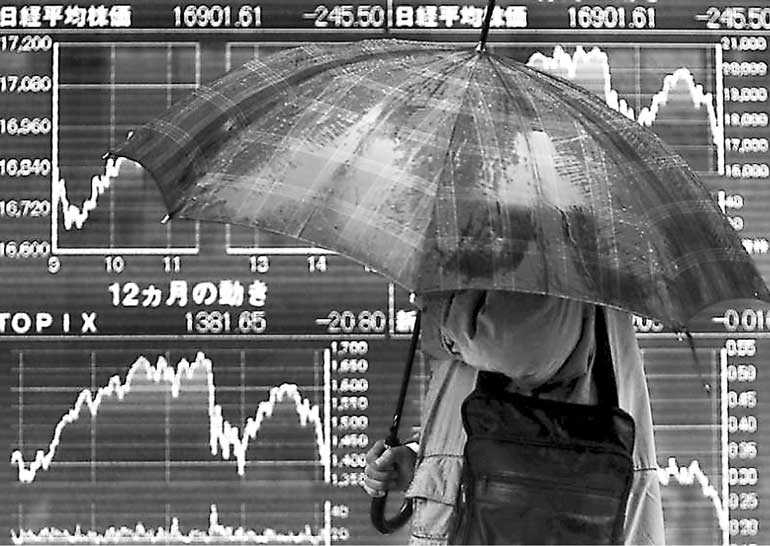Monday Feb 16, 2026
Monday Feb 16, 2026
Saturday, 25 August 2018 00:10 - - {{hitsCtrl.values.hits}}

FILE PHOTO: A pedestrian holding an umbrella walks past an electronic board showing the graphs of the recent fluctuations of Japan's Nikkei average outside a brokerage in Tokyo, Japan, - REUTERS
TOKYO (Reuters): Asian stocks fell on Friday after US-China trade talks ended without progress and market focus shifted to a speech by the Federal Reserve chairman for fresh clues on the direction of US monetary policy.
Spreadbetters expected European stocks to open mixed, with Britain’s FTSE dipping 0.15%, Germany’s DAX rising 0.1% and France’s CAC edging up 0.05%.
US and Chinese officials ended two days of talks on Thursday with no major breakthrough. At the same time, their trade war escalated with another round of duelling tariffs on $16 billion worth of each country’s goods taking effect.
MSCI’s broadest index of Asia-Pacific shares outside Japan shed 0.25%. It was still up about 1% on the week.
Hong Kong’s Hang Seng fell 0.55% and the Shanghai Composite Index dropped 0.35%.
Australian stocks rose 0.15% and South Korea’s KOSPI advanced 0.2%. Japan’s Nikkei climbed 0.65%, lifted by a weaker yen.
“Global risk sentiment remains somewhat jittery ahead of Fed Chair Powell’s speech with US-Sino trade talks failing to yield any immediate progress,” strategists at OCBC Bank wrote.
The S&P 500 shed 0.17% overnight to pull back slightly from a record high scaled midweek, with industrial shares sagging after the United States and China imposed a fresh round of trade tariffs on each other.
Shares of industrial giants Caterpillar Inc and Boeing Co, bellwethers of trade confidence, were among the biggest drags on the Dow, which lost about 0.3%. Caterpillar shares fell 2.0%, and Boeing shares fell 0.7%.
In immediate focus was the speech by the Fed Chairman Jerome Powell to be given later on Friday at the Jackson Hole, Wyoming, meeting of central bankers.
Where Powell stands on the pace of interest rate hikes will be scrutinised after minutes from the Fed’s most recent policy meeting indicated the central bank would tighten monetary policy soon.
“For equities, the key point will be whether Powell indicates that the Fed is poised to hike rates two more times this year. That would fall in line with expectations and not cause much of a stir,” said SoichiroMonji, senior economist at Daiwa SB Investments in Tokyo.
“Any mention of recent turbulence in the emerging markets may also provide the risk asset markets with some relief.”
US President Donald Trump reiterated his displeasure with the Fed’s rate hikes earlier this week and investors waited to see whether Powell would respond to such criticism.
The Fed should raise rates further this year and probably next year as well, despite Trump’s opposition to tighter policy, Kansas City Fed President Esther George said in interviews aired on Thursday.
Dallas Fed President Robert Kaplan also said Trump’s comments would not affect the central bank’s decision making.
The dollar index against a basket of six major currencies stood at 95.567, holding most of its gains after rising 0.55% overnight to snap a six-day losing run.
The greenback extended its overnight surge to touch a two-week high of 111.49 yen. The euro was 0.15% higher at $1.1553 after retreating 0.5% the previous day.
The Australian dollar received some respite after Australian Treasurer Scott Morrison won a ruling party leadership vote, paving the way for him to become the country’s next prime minister and ending a week of political uncertainty.
The Aussie was up 0.4% at $0.7277. On Thursday, it slumped 1.4% as Australian Prime Minister Malcolm Turnbull faced challenges to his leadership.
Onshore Chinese yuan slipped 0.2% to 6.8916 per dollar, its weakest in a week.
Oil prices rise on Iran sanctions; trade row mutes activity
SINGAPORE (Reuters): Oil prices rose on Friday as US sanctions on Iran are expected to cut significant volumes of crude from the market, but trading was muted by concerns over the trade dispute between Washington and Beijing.
Brent crude oil futures were at $75.19 per barrel at 0530 GMT, up 46 cents, or 0.6%, from their last close.
US West Texas Intermediate (WTI) crude futures were at $68.34 per barrel, up 51 cents, or 0.8%.
Traders said the supply versus demand outlook for oil markets was relatively tight because of the looming US sanctions against Iran, which will target oil exports from November.
Iran is the third-biggest producer within the Organization of the Petroleum Exporting Countries (OPEC), exporting on average around 2.5 million barrels per day (bpd) of crude and condensate this year, equivalent to around 2.5% of global consumption.
“Third-party reports indicate that Iranian tanker loadings are already down by around 700,000 bpd in the first half of August relative to July, which if it holds will exceed most expectations,” US investment bank Jefferies said on Friday.
“We expect that by Q4 the market will be dealing with either undersupply, dwindling spare capacity - or both,” it added.
Energy consultancy FGE says it expects Iran’s crude and condensate exports to drop below 1 million bpd by mid-2019.
Despite this, sentiment in markets was cautious, traders said, after US and Chinese officials talks aimed at resolving an escalating trade dispute ended on Thursday with no major breakthrough. Instead, both countries activated another round of duelling tariffs on $16 billion worth of each other’s goods.
“Investors are likely to feel nervous as the two countries vow to step up the pressure,” ANZ bank said on Friday.
Yet amid the escalating trade war, China’s Unipec will resume purchases of US crude oil in October, sources told Reuters on Friday, after a two-month halt due to the trade dispute between the world’s two largest economies.
Despite this, many analysts expect US crude to be hit with tariffs eventually should no solution be found.